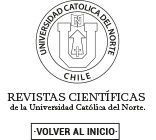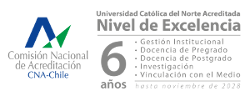Ethical standards
Ethical standards
Ethics Code
This code states the ethical commitment of all those participating in the process to elaborate “Proyecciones” authors, single blind peer reviewers, and the institution itself, represented by the editor and the editorial board.
Proyecciones is a Mathematics journal, published by the Universidad Catolica del Norte (UCN).
This code was developed on the basis of Core practices of the Committee on Publication Ethics (COPE), internationally recognized.
On Publishing Process
After the submission of your manuscript:
- Editor’s assessment: Editors review the scope, content and language of the
manuscript to decide whether or not it merits peer review. - Peer review: The manuscript undergoes peer review to obtain feedback from other
experts on the quality of the submission. There are different types of peer review.
We use Single blind review: Reviewers know the author’s name, but the
author does not know the name of the reviewers. - Editor’s decision: Following peer review, editors choose to recommend the article
for publication, send it back to the author for revisions or reject it. - Revisions: Authors are required to implement revisions based on the
feedback from editors and reviewers. Authors have to respond to comments
from reviewers. - Final decision: The editor makes a final acceptance or rejection decision.
Once a manuscript is accepted, it is moved to production.
EDITOR’S RESPONSIBILITIES
Decision on paper publication
The editor is responsible for deciding what papers submitted to the journal will be published. His/her decision must be based on the journal publication standards, together with reviewers’ judgment, and, in some cases, the opinion of the editorial board members. In addition, the editor will be subjected to the legal requirements of copyright, defamations, and plagiarism.
Papers will only be reviewed for their intellectual quality and originality.
Conflicts of interest
During the publication process, data and ideas contained in the paper cannot be used for personal advantage by any individual able to access it, unless he/she has the author’s explicit permission.
Confidentiality
Neither the editor, nor any member of the editorial board can provide information about the papers submitted, nor institutions other than the author or authors, the author’s or authors’ institution, eventual reviewers, reviewers, or any other member of the editorial board.
AUTHOR’S RESPONSIBILITIES
Paper submission
Authors submitting unedited papers, not published or submitted to review by any other scientific journal, must follow the editorial standards of the journal. In addition, statements, conclusions, and data contained in the paper must be presented reliably. Misleading or intentionally inconsistent statements are unacceptable due to immorality and will be a sufficient reason for not publishing the paper.
Originality and plagiarism
The submission of a paper for publication implies that it is thoroughly unedited. Citations from papers belonging to the same author or other authors must include their corresponding bibliographic citation. A text copied from another author, without the corresponding citation, will be considered plagiarism, thus representing a serious intellectual immorality that will cause the paper to be rejected, along with denouncing plagiarism.
Multiple publication
Authors must not submit manuscripts substantially dealing with the same topic or with the same approach to more than one journal or any other type of publication at the same time. The submission of the same manuscript or one essentially identical to more than one journal is a serious immorality that will cause the manuscript to be rejected.
Source acknowledgment
Authors must explicitly acknowledge the work of other authors in their paper and duly cite the publications on which they based their document.
Financial source acknowledgment
Authors must clearly indicate the financial sources of the study the manuscript is based on.
Conflict of interest
Authors must also clearly indicate any other financial source that may influence data interpretation and discussion.
Manuscript authorship
Manuscript authorship is limited to the authors essentially contributing to its conception, design, interpretation, and writing. All of them must be included as co-authors. In addition, the collaboration of other individuals somehow contributing to the manuscript must also be acknowledged.
Serious errors in manuscripts
If an author discovers a serious error in his/her manuscript, he/she must report to the editor on a timely basis, along with helping the editor to correct the error.
Data access
Authors may be asked to provide the general data of their study. So, they must be willing to allow public access to them. In addition, they must be ready for allowing access to these data, even after publishing their paper.
Correspondence
The author or one of the authors must be responsible for communicating with the journal. He/she must make sure that all the co-authors be duly included in the paper. He/she must also make sure that all the co-authors go through the final version of the manuscript and agree on its publication. Also, he/she must make sure that no inappropriate individual appears as an author.
REVIEWER’S RESPONSIBILITIES
Review
The reviewing process has a two-fold purpose: helping the editor to make a decision concerning the publication of the manuscript submitted to the journal and collaborating with the authors so that they can improve their paper.
Every reviewer who does not feel capable of reviewing the manuscript assigned or unable to review the manuscript on time, must report this to the editor and excuse him/herself from the reviewing process.
Confidentiality
Manuscripts submitted must be confidentially dealt with. This means that they must not be sent, neither shown, nor discussed with other individuals, except for subjects designated by the editor in special cases.
Ideas and data obtained during the review of the manuscript must be kept under confidentiality and not be used for personal advantage at all.
Objectivity standards
Reviews must be made objectively and impartially. They must not contain any personal critique to the authors. In addition, reviewers must clearly and express and support their observations, comments, and opinions regarding the manuscript.
Source acknowledgment
Reviewers must identify the studies mentioned in the manuscript, which were not cited by the authors since any statement made in the document must be accompanied by its corresponding citation. If the reviewer discovers that the manuscript is essentially similar to other papers, he/she must report to the editor.
Conflict of interest
Reviewers must not review manuscripts with which they have conflicts of interest due to co-authoring, friendship, rivalry or any other type of relationship with the author, authors or institutions related to the manuscripts.











